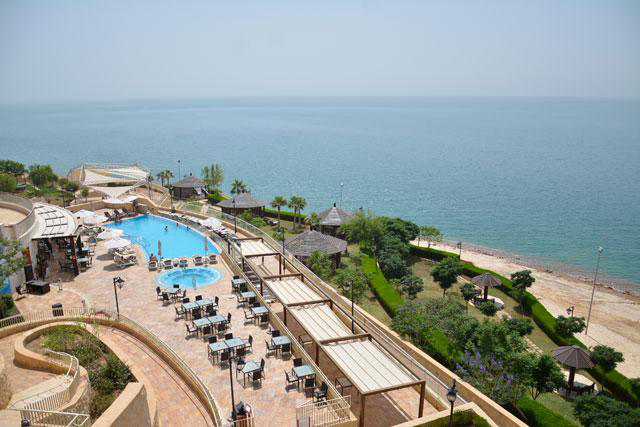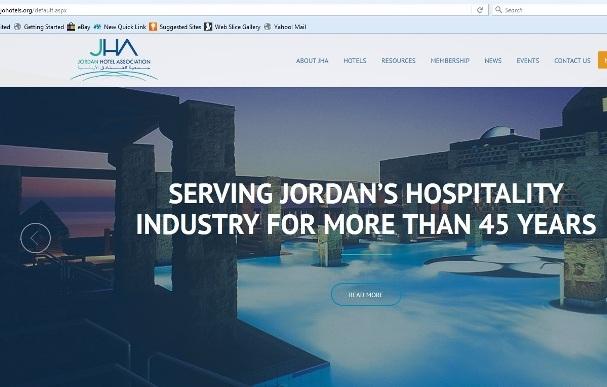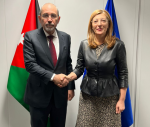You are here
Hotel industry on path to pre-pandemic levels — JHA
By Mays Ibrahim Mustafa - Jan 30,2023 - Last updated at Jan 30,2023

The hotel industry in Jordan is rebounding faster than expected, according to the Jordan Hotels Association (File photo)
AMMAN — The hotel industry in Jordan is rebounding faster than expected, according to the Jordan Hotels Association (JHA).
“The industry’s recovery is progressing at a solid rate,” JHA spokesperson and board member Mohammed Al Qasim, told The Jordan Times, predicting its return to pre-pandemic levels in 2024.
The recovery process was expedited by low cost carriers and flights which allowed the Kingdom’s tourism sector to tap into new markets and receive more visitors, he added.
“Jordan’s track record as a safe and stable destination, despite current turbulences in the region was also a contributing factor,” he continued.
The Kingdom’s tourism income increased by 115 per cent during the first 11 months of 2022, compared with the same period of 2021, reaching $5.3 billion, according to the Central Bank of Jordan (CBJ).
“This is indicative of the sector’s potential to create jobs and boost Jordan’s economic growth,” said Qasim.
The tourism sector has a “multiplier effect” across various other sectors, including transport, food services and entertainment, marked by its ability to create a diversified range of employment opportunities, he noted.
However, persisting challenges, such as skilled labour shortages, continue to pose a threat to the hotel industry’s recovery, according to Qasim.
JHA’s 2022 statistics show that the Kingdom’s hotel industrycurrently employs 21,562 workers compared to 20,920 workers in 2019.
Qasim noted that roughly 2,500 to 3,000 Jordanian workers were recruited in the tourism sector in neighbouring countries over the past two to three years.
He stressed the need for public-private partnerships to implement training programmes and retain skilled workers.
According to Qasim, the association has recently launched a free training programme benefiting 100 Jordanians between the ages of 18 and 30.
The training, which ends in participants’ employment, covers various specialties such as hotel management as well as food and beverage services, he said.
Qasim also said that statistics indicate that the overall number of licensed hotels across the Kingdom, including apartment hotels and camps, has decreased from 604 in 2019 to 594 in 2022.
However, the number of five-star hotels in Amman increased from 18 in 2019 to 20 in 2022 and that of four-star hotels increased from 30 to 34, he added.
The closure of 10 hotels over a period of four years can be attributed to various factors including the repercussions of the COVID-19 pandemic, according to Qasim.
“But this number is not worrying,” he said, noting that hotels are rarely permanently closed; “they’re more likely to be sold and reopened or to change their management and name”.
Moreover, Qasim stressed the need to facilitate access to soft loans in order to encourage growth in the industry and allow hotels to improve their facilities and services.
“Reducing fees and offering tax concessions can also encourage local and foreign investments, especially near tourist attractions in the Kingdom’s northern and southern regions,” he said.
Other posed challenges include operational costs, especially the one’s related to water, energy and licensing, he added, noting the need to encourage and facilitate hotels’ transition to reliance on alternative energy resources.
The association is also working on addressing the issue of unlicensed hotels, “which poses economic as well as safety concerns”,in addition to overcoming seasonality in the tourism sector.
This can be achieved through introducing festivals and developing niche products such as adventure travel or religious, historical and cultural tourism, according to Qasim.
Related Articles
AMMAN — The General Union for freelancers and service workers is demanding the government to increase the 5 per cent service charge to its p
AMMAN — The World Bank on Monday predicted the Jordanian economy to grow by 2.1 per cent in 2022, the Jordan News Agency, Petra, reported.Th
AMMAN — When planning holidays, most tourists book their trips online, but booking engines often take a hefty commission on hotel reservatio
















